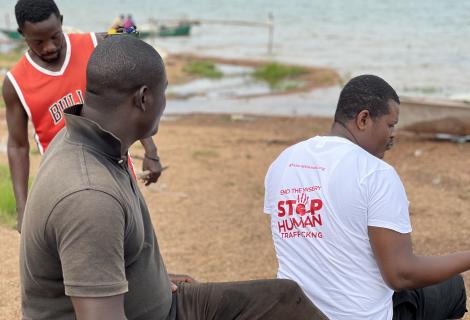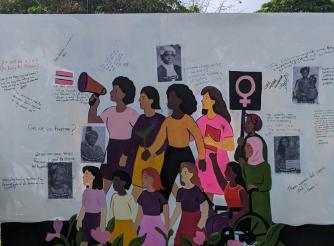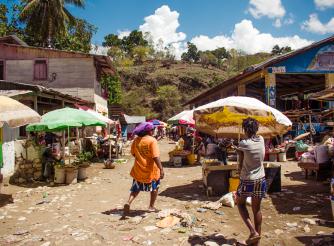Why ActionAid is working to tackle modern slavery

Attention must be dedicated to upholding human rights in the world of work.
Recent UN reports suggest an estimated 50 million people live in modern slavery situations, and 79 million children are exploited in the worst forms of child labour. Without our collective action, these figures will continue to rise.
The facts
Modern slavery is an illegal form of exploitative labour for commercial or personal gain. Under its umbrella is forced labour, forced marriage, child labour, debt bondage, and human trafficking. One of the most prevalent forms of modern slavery in Africa is human trafficking.
It is also the third most profitable crime after drugs and counterfeit goods. Multinational companies must be robustly regulated and held accountable for any links to modern slavery within their supply chain. The latest figures show that forced labour in the private sector generates over $150 billion a year. In Ghana, exploitative work in fishing, cashew plantations and the mining industry is vast.
Child labour
Child labour is not a new phenomenon. Despite the historic universal ratification of the International Labour Organisation's (ILO) Convention 182 (a legally binding treaty that protects children from the worst forms of child labour), 160 million children are still exploited and forced to work. This is an increase of 8.4 million since 2017, and reports suggest that this will rise by 9 million by the end of 2022.
At the age of three, Samuel was trafficked to Oti Region in Ghana to work in the fishing sector. His day began at 2am: "When the fishing net gets stuck at the bottom of the lake, my master will force me to dive in and untangle the net. I taught myself to swim." Sadly, Samuel's terrifying story is one of many in the region where children are exploited and deprived of a decent education.
ActionAid’s research reveals that 80% of people being trafficked for work in Ghana are children, whereas in Ethiopia an estimated 43% of children are engaged in different forms child labour, with an estimated 20,000 sold by their parents each year. Widespread poverty made worse by the Covid-19 pandemic, as well as conflict and harmful traditional practices are some of the reasons child labour has continued to rise in recent years.
Our work
In 2021, ActionAid launched the Combatting Modern Slavery project in Ghana and Ethiopia with support from the Norwegian Agency for Development Cooperation (Norad). In Ghana, child labour and human trafficking are most prevalent within the agricultural sector. ActionAid Ghana has partnered with the General Agricultural Workers Union (GAWU) to tackle the increasing incidences of modern slavery in Ghana by advocating for the regulation of agribusinesses and supporting survivors of modern slavery. This includes the repatriation of trafficked persons, provision of legal support, and the reintegration of rescued child labour survivors back into the community.
In Ethiopia, ActionAid Ethiopia and its partners are working in the community to support vulnerable women in Hosanna Town and Soro Woreda by enhancing their resilience against modern slavery through entrepreneurship and business management training.
In Ghana, ActionAid has also been conducting similar awareness training work, and results are already becoming apparent; following a recent training in Ghana's Upper West region, a community member intercepted a bus carrying a group of trafficked girls. She said:
"I went to the market, and in the evening, when I was set to go home, I passed by a shop at the station and saw a group of young girls between 13 and 16 years in a bus and I recalled the part of training that was on human trafficking, so I got closer and interrogated them. One of the girls said they were going down south to work and had had a contact number but no other information. I asked the driver where he was taking them, but he did not respond to me. I called the social welfare officer, and eventually, the police arrested the driver, and the girls were returned to their various homes."
This account is shocking and deeply concerning. It illustrates how vital it is that ActionAid works with partners in these countries to raise awareness of modern slavery and work together to stop it from happening.
Four ways we can ensure decent work and combat modern slavery
- Raise awareness: awareness raising can help protect those most vulnerable to forms of modern slavery, including trafficking and child labour. Using the media to disseminate messages on modern slavery, such as the signs of human trafficking, as well as workers’ rights and the laws protecting them can help reduce vulnerability, prevent crimes, and curb the growth of forms of modern slavery.
- Policy change: influencing policy change either to create new legislation or strengthen existing laws and policies can improve conditions for workers and reduce the prevalence of forms of modern slavery. For example, universal ratification of ILO Convention 190 will help ensure a legal framework that provides and enforces workers’ rights in the workplace.
- Amplify the voice of survivors: the voice of survivors must be heard! We must ensure that our advocacy and campaigning on issues related to decent work and modern slavery is survivor-focused, and that the voice of those directly affected is clearly heard in global discussions.
- Demand business accountability: Global supply chains, even those producing “ethical” goods are frequently affected by forms of modern slavery. By calling on governments to actively engage in negotiations for a UN Binding Treaty on Business & Human Rights we can help create a world where big businesses are held accountable for taking steps to promote decent work and eliminate modern slavery.


